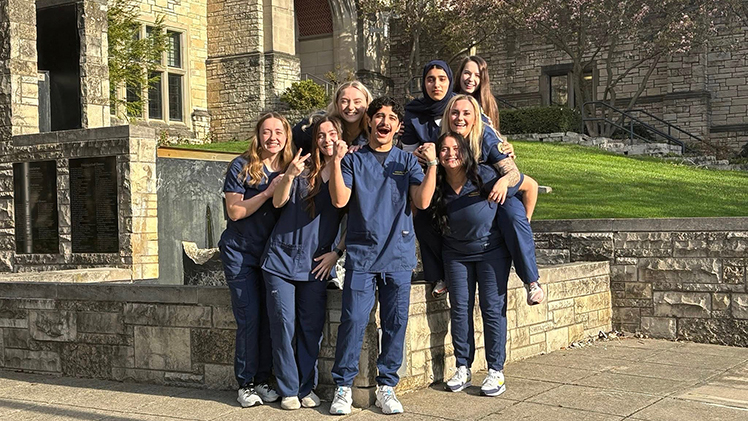With a job offer already in hand, Brooklyn Owens was eager to get credentialed as a registered respiratory therapist and get to work after graduating from The University of Toledo this spring.
Less than a month after earning her degree, Owens was a fully licensed respiratory therapist, having passed both portions of the national exam on her first try.

All eight spring graduates of UToledo’s Respiratory Care Program passed the national registered respiratory therapist credentialing exams on their first try.
It was an impressive accomplishment — and one she shares with the other spring graduates of UToledo’s Respiratory Care Program. All eight members of her class passed their national exams on the first attempt.
“I knew my professors had faith in me, and I 100% believe that if I did not have them, I would not have passed as quickly as I did,” Owens said. “The program at UToledo sets you up to be a great respiratory therapist. It is by no means easy, but it is so worth it.”
Dr. Nicole McKenzie, an associate professor and director of the respiratory care program, said UToledo places a high emphasis on ensuring its graduates are job-ready upon graduation.
“From day one, we reiterate to our students how important it is that they get that registered respiratory therapist credential. We give them the skills and knowledge, but it’s the credential that makes them employable,” McKenzie said. “Our students have historically done well, but to have a 100% first-attempt pass rate is really special.”
Respiratory therapists work closely with physicians to diagnose, treat and manage patients with heart and lung conditions. Many work in emergency rooms and critical care units, though the specialty is widely deployed across healthcare settings caring for everyone from newborns to geriatric patients.
Alyssa Jackson, another member of the class of 2025, has seen firsthand the impact respiratory therapists can have.
Her sister Emily Jackson — a 2018 UToledo graduate — had cystic fibrosis, a chronic lung disease that required lifelong respiratory care.
“Sadly, she passed away in 2019 while awaiting a double lung transplant,” Jackson said. “I’m pursuing this degree in her honor and memory, with the hope of helping others like her as they fight their own battles.”
Like Owens, Jackson said UToledo’s program prepared her well.
“The respiratory therapy program at UToledo offers incredible hands-on experience, guided by some of the best professors who are always available to support you — no matter the time of day,” she said. “Respiratory therapy is an amazing career where you truly make a difference, often working with the most critical patients and playing a vital role in their care and recovery. If you’re looking for a rewarding and impactful healthcare path, this program is definitely worth considering.”
Jackson recently moved to Greenville, South Carolina, for a full-time job at Prisma Health Children’s Hospital.
To get credentialed, graduates must first take a 160-question multiple-choice exam. Those who score high enough earn the entry-level certified respiratory therapist credential and the ability to take the clinical simulation exam. Passing that exam confers the advanced registered respiratory therapist credential.
According to the National Board for Respiratory Care, which administers the accreditation testing, the first-time pass rate in 2024 was less than 70% for the multiple-choice exam and less than 63% for the clinical simulation exam.
“This cohort really worked hard and it blows me away how quickly they did it. These are challenging tests, and this level of success speaks volumes to their dedication,” McKenzie said. “We’re so proud of these students.”
While this is the first time UToledo has had a 100% first-attempt pass rate under the current credentialing program, UToledo’s program has been consistently recognized for how well it prepares its graduates.
Over the last three years, UToledo’s program has seen 96% of its graduates go on to earn the registered respiratory therapist credential. The national average among the country’s 400-plus accredited programs is currently 72%. That success helped UToledo earn an eighth-straight Distinguished RRT Credentialing Success Award from the Commission on Accreditation for Respiratory Care earlier this month.
UToledo also has a 100% job placement rate for graduates of its Respiratory Care Program, including this year’s class.
Owens, who grew up in Lima, is currently training to work in the neonatal intensive care unit /pediatric intensive care unit at ProMedica Toledo Hospital.
“I am so happy to be where I am in life, and I am forever grateful for the UToledo Respiratory Care Program,” she said. “College is such a unique and sometimes scary experience, but it is possible for everyone. Toledo has so many accommodating services available to make it great for you no matter your needs. I would choose The University of Toledo again and again.”